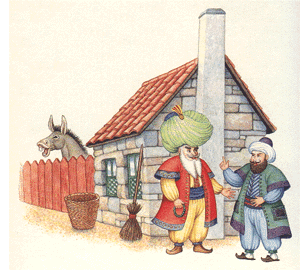Nasreddin Hodja on the Deathbed
Hodja got very ill and was about to die. He called his wife and said to her:
“Beloved wife, put on your best clothes and perfume, and comb your hair – in short, do all you can to look as beautiful as you can be!”
She answered sobbing, “Don’t say things like that! How can I do all these things with you dying! I will never think of these things again after you have passed away!”
Hodja said; “Do it for me, and come and sit by me.”
The woman did everything to look as marvellous as she could, and sat down next to him.
She asked him, “Did you want to look at my beauty before you die?”
Hodja said, “No. They say ‘Death chooses the best,’ and I thought the angel of death, might see you and decide to take you instead of me.”
_____________________________

Hodja or the Donkey?
A neighbour came to the gate of Mulla Nasreddin’s yard. The Mulla got out to meet him outside.
“Would you mind, Mulla,” the neighbour asked, “lending me your donkey today? I have some goods to transport to the next town.”
The Mulla didn’t feel inclined to lend out the animal to that particular man. So not to seem rude, he answered:
“I’m sorry, but I’ve already lent him to somebody else.”
Suddenly the donkey could be heard braying loudly behind the wall of the yard.
“You lied to me, Mulla!” the neighbour exclaimed. “There it is behind that wall!”
“What do you mean?” the Mulla replied indignantly. “Whom would you rather believe, a donkey or your Mulla?”
______________
Please see Parable: Watermelons and Walnuts for a brief profile of Hodja and click on Parables for a complete list of parables published in this website.

Before I explore more parables like these two about the dying Hodja and the Mulla Hodja, I find also the readings of Mowlana Jalalludin Rumi full of very deep messages in the world of Spiritual understanding of Islam, meaning, Sufism that later developed from merely the traditional or just conventional practice of our Faith. Thanks for this!